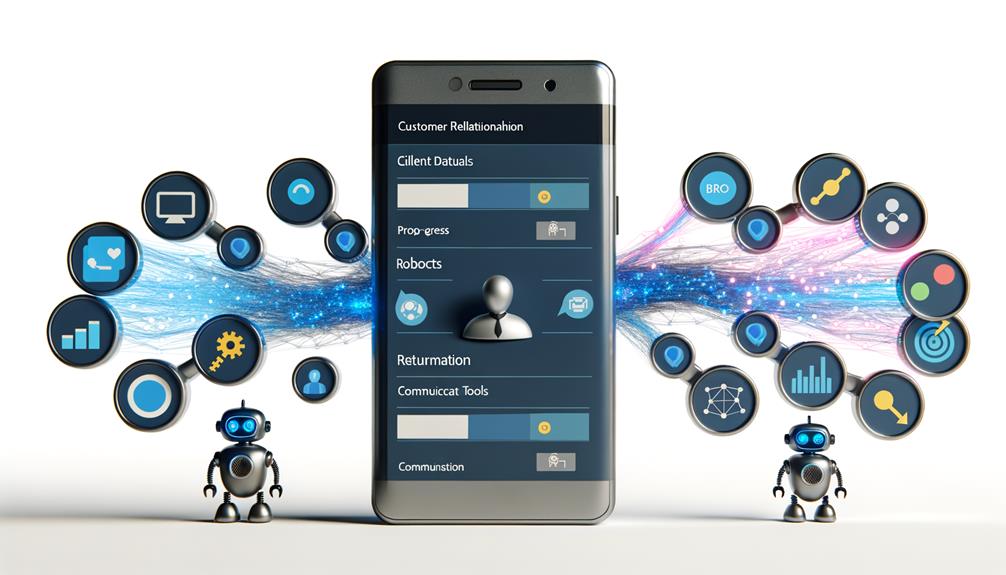AI integration in CRM operations can drastically streamline your workflows. It automates routine tasks such as data entry, enhancing operational efficiency and accuracy. AI-powered chatbots handle most customer inquiries, minimizing manual effort while delivering personalized responses. Predictive analytics can reduce your churn rates, saving you valuable resources. These applications of AI result in cutting operational costs by up to 30%. Integrating conversational AI and using AI for marketing optimization could result in even further cost reductions. Learn more to leverage AI, enhance your customer engagement, and ultimately drive your organization's bottom line.
Understanding AI in CRM Operations

To fully understand the role of AI in CRM operations, it's essential to comprehend how it automates manual tasks such as data entry, greatly reducing errors and saving valuable time. This automation leads to an impressive 25-30% increase in productivity within your customer service teams. AI-powered chatbots, for instance, can handle up to 80% of routine customer inquiries. This not only enhances the customer experience but also notably cuts your operational costs. Additionally, AI-driven predictive analytics can help reduce churn rates by 10-15%, thereby increasing efficiency and profitability. By 2025, the use of AI in CRM is expected to create a staggering $1.1 trillion in value for businesses globally. Therefore, adopting AI can drastically reduce operational costs and boost customer satisfaction.
Role of AI in Operational Efficiency

How can AI boost operational efficiency in CRM operations, you might ask? AI bolsters efficiency by automating routine tasks, thereby reducing manual errors. This process automation helps streamline operations and reduce costs. AI also excels in data analytics, detecting patterns, behaviors, and trends that can enhance fraud prevention. With the alarming rise in check fraud incidents since 2018, AI's role has become essential. It greatly reduces the time required to review fraud cases, further increasing operational efficiency. Additionally, with global Anti-Money Laundering (AML) fines against companies increasing annually, AI's ability to aid in compliance efforts is important. By reducing inefficiencies and costs, AI plays an integral role in enhancing operational efficiency.
AI and Cost-cutting Strategies

As you consider the application of AI in the field of CRM, it is important to understand how it contributes to cost-cutting strategies. AI can automate repetitive tasks, implement AI-powered chatbots, and predict customer behavior, all of which can greatly reduce operational costs. In the next section, we will analyze how implementing AI strategies and AI's role in expense management can be vital for businesses aiming for efficiency and cost reduction.
Implementing AI Strategies
Implementing AI strategies in your CRM operations, you'll not only automate routine tasks such as data entry and customer interactions, but also cut operational costs to a large extent. AI assists in error reduction, particularly in manual data entry, providing your employees more time to concentrate on complex tasks. AI tools, such as Google Cloud's anti-money laundering technology, enhance compliance efforts, reducing time spent on fraud case reviews. By analyzing vast data sets, AI can detect unusual patterns and behaviors, thereby increasing security and preventing potential fraud in CRM operations. The time savings achieved through streamlined processes and consistent algorithm-driven follow-ups also contribute to cost reduction. The strategic implementation of AI in CRM is a game-changer for operational efficiency.
AI in Expense Management
Entering the domain of expense management, you'll find that AI's cost-cutting strategies can offer significant benefits, such as automating the tracking and analysis of expenses, thereby reducing operational costs. AI algorithms can identify cost-saving opportunities and detect fraudulent expenses. With AI, you can streamline expense reporting, improve accuracy, and enhance compliance with expense policies. Additionally, AI-driven solutions provide real-time insights into spending patterns, enabling you to make informed decisions to further cut costs. Implementing AI in expense management not only eliminates manual tasks but also reduces errors, increasing efficiency in cost control processes. The integration of AI in expense management can lead to significant savings, proving its worth in reducing operational costs.
Automating Tasks With AI

Let's now turn our attention to how AI can automate tasks within CRM systems. By understanding the basics of AI task automation, you can see how it dramatically reduces operational expenditure by streamlining CRM processes. This approach not only enhances efficiency but also allows resources to be channeled towards more strategic, revenue-generating activities.
AI Task Automation Basics
Ever wondered how AI task automation can revolutionize your CRM operations? AI reduces costs by automating repetitive tasks like data entry, thereby enhancing operational efficiency. This eliminates manual errors that tend to increase operational expenses.
The integration of conversational AI in CRM further streamlines customer interactions, saving valuable time that you can allocate to complex projects. This automation not only boosts productivity but also allows AI to reduce the burden of routine tasks on your team.
Reducing Operational Expenditure
Essentially, building on the foundation of AI task automation in CRM, you'll find that automating tasks with AI can lead to a significant reduction in operational expenditure. This cost-saving is manifested in several ways. AI tools, for instance, enable the automation of repetitive CRM tasks. This not only reduces costs but also saves valuable time, thereby increasing efficiency. Studies indicate a potential 25% reduction in operational costs with AI application. The automation process also decreases manual errors, with a notable 40% reduction. For routine tasks like customer inquiries, AI-powered chatbots handle up to 80%. This leads to substantial savings on operational expenses related to customer support. Essentially, AI's application in CRM tasks is a solid strategy for reducing operational expenditure.
Streamlining CRM Processes
In your quest to streamline CRM processes, you'll find that AI's ability to automate routine tasks such as data entry not only saves time but also significantly reduces manual errors. The AI Can Help in three specific ways:
- By implementing AI, you can experience a 30% increase in operational efficiency.
- AI-powered chatbots can handle up to 80% of routine customer inquiries, greatly reducing the workload on human agents.
- AI algorithms can analyze customer data to personalize interactions, thereby increasing customer satisfaction and brand loyalty.
AI for Enhanced Customer Engagement

As you work to enhance your customer engagement, consider the role of AI in your CRM system. It can automate routine customer interactions and provide timely, personalized responses, thereby improving customer satisfaction and engagement. AI-powered chatbots can be a game-changer, delivering instant responses 24/7, keeping customers engaged.
These AI solutions analyze customer data, enabling more personalized interactions that resonate better with your clientele, improving loyalty and satisfaction. Beyond this, AI-driven CRM systems streamline processes, saving precious time and resources, enhancing overall efficiency. Tools like AI virtual assistants further reduce manual workloads, freeing up your team for more complex tasks. So, in the pursuit of enhanced customer engagement, integrating AI into your CRM processes presents a potent strategy.
Optimizing Marketing Through AI

Harnessing the power of AI for your marketing initiatives can lead to impressive results, with personalized campaigns boosting customer engagement by up to 74% and AI-powered automation slashing operational costs by an average of 12%.
- Customer Data Analysis: AI tools analyze customer data to tailor personalized marketing content, resulting in a 20% increase in conversion rates.
- Performance Optimization: AI algorithms scrutinize marketing performance in real-time, optimizing expenditure by up to 30%.
- Automated Lead Scoring: This AI application can elevate sales productivity by 50% and curtail marketing costs by 33%.
AI's sophistication in marketing optimization isn't just about cost reduction; it's about intelligently utilizing resources, improving efficiency, and delivering superior, data-driven customer experiences. So, harness AI's power to elevate your marketing strategy.
AI Integration for Process Streamlining

Delving into the domain of AI integration for process streamlining, you'll find that it's a game-changer in CRM operations, deftly reducing manual efforts while enhancing efficiency and accuracy. AI-powered CRM systems seamlessly automate repetitive tasks, such as data entry, lead management, and customer interactions, thereby eliminating human errors and speeding up workflows. By integrating AI, you not only streamline operations, but also increase productivity, leading to significant cost savings. Additionally, AI's capacity to enhance data accuracy means personalized customer interactions are achievable, further optimizing CRM operations. With the integration of Artificial Intelligence, you're not just automating mundane chores, you're redefining the entire CRM process, providing a catalyst for operational excellence and bottom-line growth.
Overcoming Challenges in AI Adoption

Despite the surge in AI adoption, with over 80% of enterprises projected to use generative AI APIs or applications by 2026, understanding and addressing the challenges that could potentially hinder its successful integration into CRM operations is crucial.
Here are three key challenges you'll face:
- Hiring for AI Roles: AI is evolving, creating new roles that demand a different skill set. You'll need to attract and retain top talent to stay competitive.
- Data Security: With machine learning algorithms processing vast amounts of data, ensuring data security is paramount. You must implement robust protocols to protect your sensitive information.
- Privacy Concerns: You must be vigilant about how AI uses and stores data to avoid privacy breaches.
Overcoming these challenges can pave the way for AI to reduce costs and improve CRM processes.
Measuring Impact of AI in CRM

To gauge the impact of AI in CRM, it's important to examine key performance indicators such as operational costs, productivity, response times, customer satisfaction, and churn rates. The integration of AI can reduce costs and improve efficiency, leading to significant improvements in these areas.
Let's take a look at some numbers:
| Key Performance Indicator | Impact with AI |
|---|---|
| Operational Costs | Reduced by 30% |
| Productivity | Increased by 25% |
| Response Times | Reduced by 20% |
| Customer Satisfaction | Increased by 35% |
| Churn Rates | Decreased by 40% |
These numbers highlight how AI can streamline CRM processes through automation and efficiency improvements. By understanding these indicators, you can see the tangible benefits of implementing AI in your CRM system.



